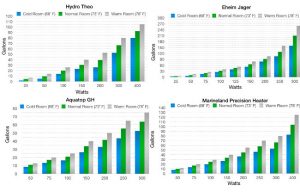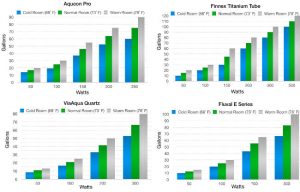When it comes to selecting the best aquarium heater size there is no “per gallon” rule that works in all cases. More often than not the size of your heater will be determined by the wattage and quality of your heater. This means the cheapest, biggest heater may not be the best aquarium heater. In fact it is often better to go for one of the better small, high quality aquarium heaters, such as the Eheim Jager.
Actions speak louder than words however. Therefore I have gone and created a list of tables to help you find the right aquarium heater size for your tank. This information has all be gathered from manufacturers, manuals, reviews and personal experience. This will help you make a much better choice than a “x watt per gallon” suggestion.
Additionally we must take into account our homes average temperature. A wind breaker doesn’t work too well during a snowstorm, so we can’t expect a heater to work just as effectively with huge differences in temperatures. For this I have done three ratings for homes at 68, 73, and 78 degrees Fahrenheit.
Aqueon Pro Heater
| Room Temperature |
50 Watts |
100 Watts |
150 Watts |
200 Watts |
250 Watts |
| Cold Room (68 F) |
14 Gal |
19.5 Gal |
37 Gal |
52.5 Gal |
60 Gal |
| Normal Room (73 F) |
17 Gal |
25 Gal |
46 Gal |
64 Gal |
75 Gal |
| Warm Room (78 F) |
20 Gal |
30 Gal |
55 Gal |
75 Gal |
90 Gal |
Fluval E Series
| Room Temperature |
50 Watts |
100 Watts |
200 Watts |
300 Watts |
| Cold Room (68 F) |
10 Gal |
20 Gal |
43.5 Gal |
66.5 Gal |
| Normal Room (73 F) |
12.5 Gal |
25 Gal |
55.5 Gal |
83 Gal |
| Warm Room (78 F) |
15 Gal |
30 Gal |
65 Gal |
100 Gal |
Finnex Titanium Tube
| Room Temperature |
50 Watts |
100 Watts |
150 Watts |
200 Watts |
300 Watts |
500 Watts |
| Cold Room (68 F) |
10 Gal |
20 Gal |
30 Gal |
60 Gal |
80 Gal |
100 Gal |
| Normal Room (73 F) |
15 Gal |
25 Gal |
45 Gal |
70 Gal |
90 Gal |
110 Gal |
| Warm Room (78 F) |
20 Gal |
30 Gal |
60 Gal |
80 Gal |
100 Gal |
120 Gal |
Hydor Theo
| Room Temperature |
25 Watts |
50 Watts |
100 Watts |
150 Watts |
200 Watts |
300 Watts |
400 Watts |
| Cold Room (68 F) |
2 Gal |
5 Gal |
14 Gal |
23 Gal |
26 Gal |
53 Gal |
80 Gal |
| Normal Room (73 F) |
4.5 Gal |
9.5 Gal |
20 Gal |
30.5 Gal |
39.5 Gal |
66.5 Gal |
92.5 Gal |
| Warm Room (78 F) |
7 Gal |
14 Gal |
26 Gal |
40 Gal |
53 Gal |
80 Gal |
105 Gal |
Eheim Jager
The Eheim earns a special note here. It has far above average heating strength thanks to its special laboratory glass, which you can read more about on the best aquarium heater page.
| Room Temperature |
25 Watts |
50 Watts |
75 Watts |
100 Watts |
125 Watts |
150 Watts |
200 Watts |
250 Watts |
300 Watts |
| Cold Room (68 F) |
4 Gal |
6.6 Gal |
15.8 Gal |
26.4 Gal |
39.6 Gal |
53 Gal |
79 Gal |
106 Gal |
159 Gal |
| Normal Room (73 F) |
5.5 Gal |
11 Gal |
21 Gal |
32.5 Gal |
46.5 Gal |
66 Gal |
92.5 Gal |
128.5 Gal |
210 Gal |
| Warm Room (78 F) |
6.5 Gal |
15.8 Gal |
26.4 Gal |
39.6 Gal |
53 Gal |
79 Gal |
106 Gal |
159 Gal |
260 Gal |
ViaAqua Quartz
| Room Temperature |
50 Watts |
100 Watts |
200 Watts |
300 Watts |
| Cold Room (68 F) |
8.5 Gal |
16.5 Gal |
33 Gal |
53 Gal |
| Normal Room (73 F) |
11 Gal |
21 Gal |
41.5 Gal |
66.5 Gal |
| Warm Room (78 F) |
13 Gal |
25 Gal |
50 Gal |
80 Gal |
Marineland Precision Heater
| Room Temperature |
50 Watts |
75 Watts |
100 Watts |
150 Watts |
200 Watts |
250 Watts |
300 Watts |
400 Watts |
| Cold Room (68 F) |
8 gal |
13.5 gal |
19.5 gal |
26.5 gal |
36.5 gal |
46.5 gal |
53 gal |
83 gal |
| Normal Room (73 F) |
10 gal |
17 gal |
25 gal |
34 gal |
45 gal |
58 gal |
66.5 gal |
104 gal |
| Warm Room (78 F) |
12 gal |
20 gal |
29 gal |
40 gal |
55 gal |
70 gal |
80 gal |
125 gal |
Aquatop GH
| Room Temperature |
50 Watts |
75 Watts |
100 Watts |
150 Watts |
200 Watts |
250 Watts |
300 Watts |
| Cold Room (68 F) |
8.5 gal |
13.5 gal |
16.5 gal |
26.5 gal |
33 gal |
43.5 gal |
52.5 gal |
| Normal Room (73 F) |
11 gal |
17 gal |
21 gal |
34 gal |
41.5 gal |
55.5 gal |
64 gal |
| Warm Room (78 F) |
13 gal |
20 gal |
25 gal |
40 gal |
50 gal |
65 gal |
75 gal |
Tetra HT
| Room Temperature |
50 Watts |
100 Watts |
150 Watts |
200 Watts |
| Cold Room (68 F) |
4 Gal |
18 Gal |
24.5 Gal |
33 Gal |
| Normal Room (73 F) |
7 Gal |
24 Gal |
37 Gal |
44 Gal |
| Warm Room (78 F) |
10 Gal |
30 Gal |
40 Gal |
55 Gal |
Zacro
| Room Temperature |
50 Watts |
300 Watts |
| Cold Room (68 F) |
10.5 Gal |
66 Gal |
| Normal Room (73 F) |
13 Gal |
72.5 Gal |
| Warm Room (78 F) |
16 Gal |
99 Gal |
Aquarium Heater Size Graphs
For those who hate tables but don’t mind looking over graphs I have converted the data just for you. A quick glance is all it takes to find the perfect aquarium heater size for your fish tank.


Keep these tips in mind when deciding what aquarium heater size you need:
- Small aquariums can be heated much quicker and should avoid oversized heaters.
- Large aquarium heaters may not work as well as two smaller heaters. This is highly dependent on water circulation. Either choose two smaller heaters or direct strong currents towards your heater for the best results.
- Always keep a back up heater! Even if your back up is a cheaper model it can still save your fish while you get a longer lasting model.
I cannot stress enough that the wattage of your aquarium heater is not the only factor for sizes. Cheaper models such as the Tetra HT cannot heat anywhere near Eheim or the Fluval E series heater. Only go for cheap heaters as back ups.


I have converted a IBC tote into a 200 gallon fish tank, in a insulated un heated room. Looking to heat it . I live in central Vermont .
Hey Mike, This is an interesting one. What I would do really depends on a few things.
How insulated is this tote? aquarium glass is surprisingly insulating due to how thick it is. Totes on the other hand can be built with insulation or built to transfer heat really well. As the room is unheated this would make a major difference. When dealing with heating we need to look at the lowest temperature you will have to deal with, which seems to be below 10 degrees. I doubt the room is hitting that low of a temperature but if it is you would need some serious power. even 300 watt heaters are only able to heat a 100 gallon tank 15 degrees in a 70 degree room.
Assuming you have not gotten any fish yet I would get two 300 watt heaters and put them on the opposite sides of the tank, staggering the heat by 2 degrees. This would mean one is set to 74 and one at 76. This lets the 74 shut off when not needed but turn on when the 76 needs help. Additionally it helps keep the water from heating too quickly when it is already warm outside and 2 heaters are not needed.
With two heaters installed check on the temp a couple times throughout the day, especially at night when it gets even colder.
If the rooms insulation keeps the temperature more consistent, then heating would not be as big of an issue. Still I would do at least two 300 watt heaters, as the value of the fish you would put in a 200 gallon tank would out weigh the cost of a second heater. Worst case you have a back up heater if one dies.
Thank you very much for your GUIDE listings. It will be very helpful to many, even for Turtles. I would like to think that ALL home aquarium Keepers, have a digital thermometer in their tanks, as the dials in these heaters are not that accurate.
Again, thank you for sharing!
I hope you can help… I have a 20 gallon ans im wantng to use an inline heater on the canister filter . The heater is 200 watt thoughi hope it will be okay . It has a temp dial I havent been able to find an inline heater with low wattage .
Hey Jerry.
It is common to use heaters rated for much larger tanks that you own. The only issue you may run into is if the water the heater/canister filter gets is not representative of the tank. For example if the heater heats water, returns it to the tank right by the canister filters intake and this warmed water is then pulled back into the filter. Simply put the system would heat water, return it but then pull in and reheat the same water mixed with new water. This may leave your tank a bit below your desired temperature.
Let me know if you have any other questions or if this explanation was difficult to follow/incomplete.